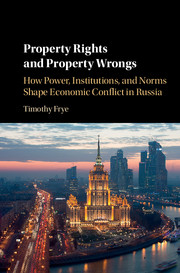 Property Rights and Property Wrongs
Property Rights and Property Wrongs Book contents
- Frontmatter
- Contents
- List of figures
- List of tables
- Acknowledgments
- Note on the text
- 1 Introduction
- 2 Power and Property
- 3 Autocratic Elections and Property Rights
- 4 Courts and Connections
- 5 Reputation and the Rule of Law
- 6 Social Norms and the Banker's Gold Watch
- 7 Conclusion
- Data Appendix
- References
- Index
1 - Introduction
Published online by Cambridge University Press: 31 March 2017
- Frontmatter
- Contents
- List of figures
- List of tables
- Acknowledgments
- Note on the text
- 1 Introduction
- 2 Power and Property
- 3 Autocratic Elections and Property Rights
- 4 Courts and Connections
- 5 Reputation and the Rule of Law
- 6 Social Norms and the Banker's Gold Watch
- 7 Conclusion
- Data Appendix
- References
- Index
Summary
We know how to do a lot of things, but deep down we don't really know what we are doing.
A long-time rule-of-law practitioner (Carothers 2006: 15)The importance of secure property rights for economic development and stable government is readily acknowledged. In the now orthodox account of economic development, secure property rights can account for The Rise of The Western World and Why Nations Fail, to quote two influential works (North and Thomas 1973; Acemoglu and Robinson 2012). But if secure property rights are so beneficial, then why are they so rare? Throughout history most owners and citizens have faced great obstacles to exercising the rights to their property. The costs of guarding property, bribing state officials, identifying honest trading partners, measuring the quality of goods, and enforcing contracts prevent businesses and citizens from making investments and trades that would benefit them and society as well. Most citizens and countries miss out on the substantial gains that can accrue from the investment and trade that flow from secure property rights.
Scholars and policy advisors have pointed to a number of sources for insecure property rights. Some argue that influential politicians and their supporters who benefit from weak property rights are the problem. Others blame incapable formal institutions, such as courts and the police that fail to protect the property of right-holders in ways both big and small. Others focus on weak informal institutions, such as social trust and concerns for reputation that make it hard for businesses to rely on social sanctions to protect property. Still others cite social norms, including religions, ideologies, or cultures that promote attitudes and values inimical to secure property rights as the major culprit.
Each of these broad approaches to property rights has a long social science pedigree. Moreover, each of these approaches is familiar to observers of Russia. Rapacious elites? Check. Weak courts, low social trust, and anti-market norms? Check, check, and check. But within each of these broad approaches many puzzles remain. Of all the dimensions of political power, which are most important for protecting property? If political power both shapes and is shaped by property rights, then how can we know whether the former influences the latter or vice versa? Can social norms about property change? If so, under what conditions?
- Type
- Chapter
- Information
- Property Rights and Property WrongsHow Power, Institutions, and Norms Shape Economic Conflict in Russia, pp. 1 - 37Publisher: Cambridge University PressPrint publication year: 2017


